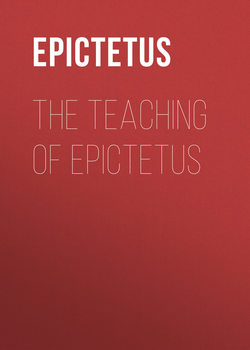Читать книгу The Teaching of Epictetus - Epictetus - Страница 6
BOOK I
CHAPTER IV
the nature of the good
Оглавление1. The subject for the good and wise man is his own master-faculty, as the body is for the physician and the trainer, and the soil is the subject for the husbandman. And the work of the good and wise man is to use appearances according to Nature. For it is the nature of every soul to consent to what is good and to reject what is evil, and to hold back about what is uncertain; and thus to be moved to pursue the good and to avoid the evil, and neither way towards what is neither good nor evil. For as it is not lawful for the money-changer or the seller of herbs to reject Cæsar’s coin, but if one present it, then, whether he will or no, he must give up what is sold for it, so it is also with the soul. When the Good appears, straightway the soul is moved towards it, and from the Evil. And never doth the soul reject any clear appearance of the good, no more than Cæsar’s coin. On this hangeth every movement both of God and man.
2. The nature and essence of the Good is in a certain disposition of the Will; likewise that of the Evil. What, then, are outward things? Matter for the Will, about which being occupied it shall attain its own good or evil. How shall it attain the Good? Through not being dazzled with admiration of what it works on.16 For our opinions of this, when right, make the will right, and when wrong make it evil. This law hath God established, and saith, “If thou wouldst have aught of good, have it from thyself.”
3. If these things are true (and if we are not fools or hypocrites), that Good, for man, lies in the Will, and likewise Evil, and all other things are nothing to us, why are we still troubled? why do we fear? The things for which we have been zealous are in no other man’s power; and for the things that are in others’ power we are not concerned. What difficulty have we now? But direct me, sayest thou. And why shall I direct thee? hath not God directed thee? hath He not given thee that which is thine own unhindered and unhampered, and hindered and hampered that which is not thine own? And what direction, what word of command didst thou receive from Him when thou camest thence? “Hold fast everything which is thine own – covet not that which is alien to thee. And faithfulness is thine, and reverence is thine: who, then, can rob thee of these things? Who can hinder thee to use them, if not thyself? But thyself can do it, and how? When thou art zealous about things not thine own, and hast cast away the things that are.” With such counsels and commands from Zeus, what wilt thou still from me? Am I greater than he? am I more worthy of thy faith? But if thou hold to these things, of what others hast thou need? But perchance these are none of his commands? Then bring forward the natural conceptions, bring the proofs of the philosophers, bring the things thou hast often heard, bring the things that thyself hast spoken, bring what thou hast read, bring what thou hast pondered.
16
“Through not being dazzled,” etc. Ἂν τὰς ὕλας μὴ θαυμάσῃ.
